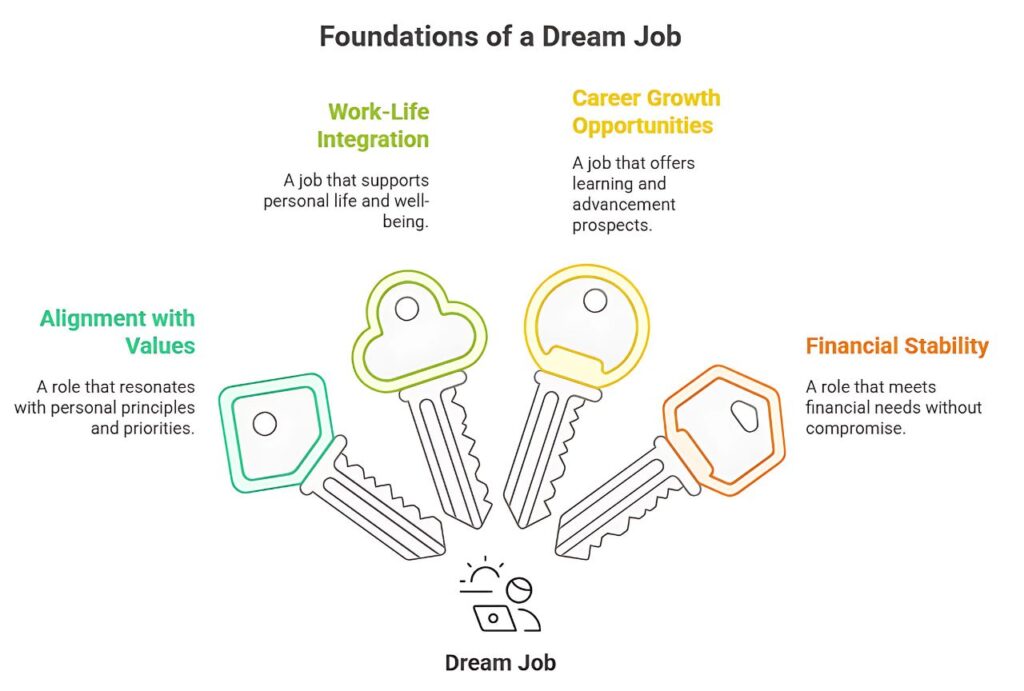Many people spend years chasing careers they believe will bring ultimate satisfaction, only to discover that their perceptions were incomplete or unrealistic. This pursuit can leave individuals feeling unfulfilled or even regretful about their choices.
A dream job is not necessarily the perfect role at a prestigious company or one that aligns flawlessly with a lifelong passion. It’s a nuanced balance of work that resonates with your values, aligns with your skills, and supports your growth and well-being. Unfortunately, these critical factors are often overlooked when defining what a dream job truly is.
I. Why Chasing the Dream Job Can Leave You Feeling Stuck
While it’s natural to aspire for a career that aligns with your passions and aspirations, the obsession with finding the “perfect role” can sometimes lead to feelings of dissatisfaction and stagnation.
One surprising reason is the immense pressure that comes with labeling a job as your dream. When you define a role as the pinnacle of your career, it can create an unrealistic expectation of constant fulfillment and happiness. This mindset leaves little room for the inevitable challenges, frustrations, or changes in personal priorities that come with any job.
Additionally, many people focus so intently on achieving their dream job that they inadvertently limit their opportunities for growth. They may reject roles that don’t perfectly fit their vision, overlooking valuable experiences that could lead to unexpected success or satisfaction. Ironically, this rigid approach can result in missing out on roles that might offer even greater fulfillment than the so-called dream job.
Chasing a dream job can also tether you to an idealized version of success that no longer resonates. Personal and professional growth means your goals and priorities will evolve. A dream job you once longed for might no longer align with who you’ve become, leaving you feeling stuck in a role that doesn’t fit your current needs.
The truth is, the concept of a dream job can be more limiting than liberating. Reflecting on this perspective encourages a more balanced approach, one that values adaptability, learning, and creating meaning in whatever role you take on, rather than chasing an elusive idea of perfection.
II. What Is a Dream Job, Really?
The concept of a dream job is often surrounded by misconceptions that lead to unnecessary frustration or unrealistic expectations. One common belief is that a dream job must perfectly align with every aspect of your passion or interests. While passion is important, it is not the sole determinant of a fulfilling career. Work that challenges you, provides opportunities for growth, and aligns with your values can be just as rewarding, if not more so.
Another misconception is that a dream job guarantees constant happiness and satisfaction. All roles come with challenges, difficult tasks, or moments of doubt. A fulfilling career isn’t defined by the absence of struggles but by the overall sense of purpose and alignment it offers.
Also, many equate a dream job with prestige, assuming that working for a well-known company or in a glamorous role inherently leads to satisfaction. However, prestige does not always translate to personal fulfillment, and what works for one person may not work for another.
The Importance of Balance
A dream job is not a one-dimensional pursuit of passion or status; it requires a balance between multiple factors. These factors include:
- Alignment with Values: A role that resonates with your principles and priorities, such as creativity, collaboration, independence, or making an impact.
- Work-Life Integration: A dream job supports your personal life and allows you to maintain well-being outside of work.
- Career Growth Opportunities: A job that offers learning and advancement prospects can keep you engaged and motivated over the long term.
- Financial Stability: A role that meets your financial needs without compromising other important aspects of your life contributes significantly to career satisfaction.

Also Read: How Interests Shape And Lead Career Choices (examples)
III. When to Say, “This Is the Dream Job for Me”
Recognizing your dream job requires clarity, introspection, and an understanding of how the role fits into your life and aspirations. It is less about finding perfection and more about identifying the role that checks the most meaningful boxes for you. Here’s how to know when you’ve found a job that truly aligns with your definition of a dream career.
1. You Feel a Strong Alignment with Your Core Values
A dream job reflects the principles and priorities that matter most to you. If the role enables you to work in an environment or on tasks that align with your personal and professional values, it’s a strong indicator that the position is a great fit. This could include working for a company with a mission you believe in, being part of a team that shares your work ethic, or engaging in responsibilities that resonate with your sense of purpose.
2. The Role Challenges You in a Rewarding Way
Fulfillment comes from growth, and the right job will offer challenges that help you learn and expand your skill set. When a role provides opportunities for personal and professional development without being overwhelmingly stressful, it creates an ideal balance for long-term satisfaction.
3. Your Contributions Feel Meaningful
Knowing that your work makes a difference is crucial in determining whether a job is truly rewarding. When your contributions are valued, and the results of your efforts are visible or impactful, it enhances your sense of achievement and reinforces that you’re in the right place.
4. You Experience a Positive Work-Life Integration
A dream job allows you to maintain harmony between your professional responsibilities and personal priorities. If the role respects your time, provides flexibility, and supports your overall well-being, it’s a sign that the position is sustainable and fulfilling.
5. You Look Forward to Work Most Days
No job is without its challenges, but if you consistently feel motivated and engaged by your work, it’s a strong indicator that the role aligns with your interests and passions. Enjoying the majority of your tasks and feeling a sense of excitement about what you do are clear signs that you’ve found a role worth pursuing long-term.
6. You See a Path for Growth
A dream job is not just about what you do today but also where the role can take you in the future. If you can see opportunities for advancement, skill-building, and greater impact within the position or organization, it suggests that the job is aligned with your long-term career aspirations.
7. You Feel Content and Balanced
A dream job isn’t about constant happiness or perfection, but it should leave you feeling satisfied and balanced. If the role enables you to grow, contributes to your well-being, and provides a sense of purpose, it’s likely a position that aligns closely with your idea of a dream career.
Not everything we want is waiting for us, some things take time and effort to create. A dream job is no different, it’s rarely something you simply discover. Instead, it’s shaped through thoughtful choices, adapting as you learn more about yourself and the job market. You might need to explore multiple roles or even shift careers, but by aligning your goals with realistic expectations and market realities, you can eventually create a role that feels both rewarding and truly your own.



